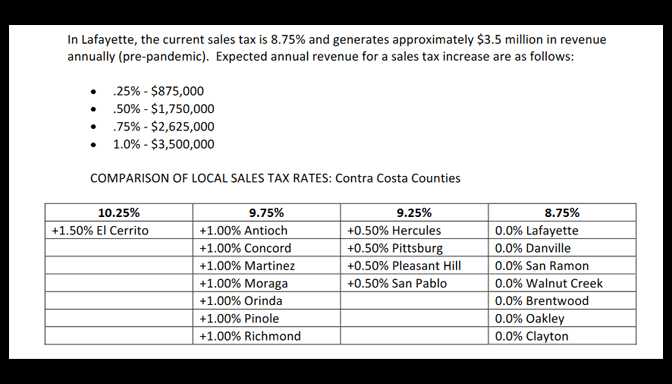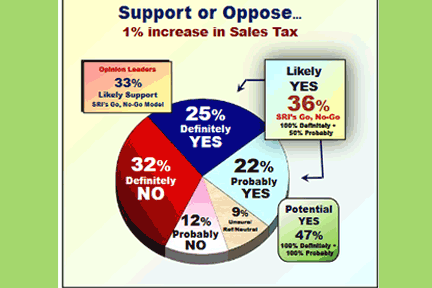The Lafayette City Council is considering placing a funding measure on the November 2024 ballot, asking Lafayette voters to authorize a local sales tax increase of up to 1% (one penny for every $1 spent locally) to address funding challenges that will soon be facing the City.
Lafayette’s City Manager, Niroop K. Srivatsa, explains that due to inflation, prices on everything from materials, to insurance, to labor have continued to increase. Furthermore, the State continues to impose a myriad of unfunded mandates. As a result, the City is facing a structural deficit of more than $2M annually, beginning in fiscal year July 2024-25. Thus, without new revenues, the City will not be able to continue offering the current level of services to Lafayette residents, or take on any new projects. In fact, City officials would have to make difficult decisions about which programs and services to reduce or eliminate entirely.
As part of the City Council’s decision about whether or not to place a funding initiative on the November 2024 ballot, the City Council will need to set the amount of the increase and stipulate if the tax will either sunset after a set period of time or be authorized permanently. Any tax increase would need to be approved by Lafayette voters.
The present Sales Tax rate for purchases made in Lafayette is 8.75%; if authorized by local voters, a 1% increase would increase the Sales Tax from 8.75 to 9.75%, which is the same rate as Moraga and Orinda. 100% of the money generated by this increase will remain in Lafayette.
Why can’t the City use its reserves to fund these projects? The City Manager explains, “City reserves are intended to be used when the City is faced with unforeseen emergencies, like wildfires, earthquakes or other natural disasters; these are one-time funds…once they are used, they are gone.”
Srivatsa said City officials are considering asking Lafayette voters to authorize an increase in the City’s sales tax, rather than addressing the City’s fiscal challenges through some other funding mechanism (such as increasing property tax) for the following reasons:
- A sales tax increase of one cent (1%) would fill the budget gap AND provide funding for additional projects like wildfire preparedness, traffic safety, maintaining more open space and building more public parks.
- A voter-approved sales tax provides funding that cannot be seized by the State; thus, the revenue will remain in the City to benefit Lafayette residents.
- A sales tax is paid by non-City residents who dine and shop in Lafayette, as well as by local residents; therefore, funds are brought into the community to benefit Lafayette residents from people who reside outside the City. For example, commuters who frequent local restaurants, purchase gas locally, and shop in Lafayette will be helping to fund services for Lafayette residents.
- Most groceries and medicines (prescription drugs) are exempt from being charged sales tax.
If passed by voters in November 2024, a 1% increase in local sales tax will cost Lafayette residents, and consumers from outside the City, one penny for every $1 spent locally.
Assuming such a funding measure passes, the City Council can develop accountability and local oversight provisions, such as establishing a citizens’ oversight committee. The measure would also incorporate annual audits, including an annual report that will be made available to the public.
Passage of such a funding measure requires simple-majority support (50 percent +1 YES vote) from Lafayette voters; the revenue generated from a successful funding Measure will be placed in the City’s General Fund.
The City Manager stresses, “Lafayette was incorporated in 1968 as a limited-service City and we are very proud to have been able to keep expenses down and consistently balance our budgets. Unfortunately, if Lafayette voters do not authorize an increase in the local sales tax, City officials will need to make cutbacks in services and programs presently being provided by and/or through the City; some services may have to be eliminated.
“As we continue to address the fiscal challenges facing the City of Lafayette, we will keep the community informed regarding Lafayette’s financial status. We are still in the discussion phase and the City Council will need to consider the matter and decide whether to place a measure on the November 2024 ballot by early August,” Srivatsa concludes.

To keep informed about this and other relevant topics:
- Use the City’s online e-notification tool at https://lovelafayette.org/e-notification to sign up to receive City Council meeting agendas, the Weekly Roundup, and other notices from the City.
- Email City Staff at: [email protected]
For further information, please refer to the following:
- Read the January 2024 issue of Lafayette Vistas to learn more about the convoluted world of City finances and the May 2024 issue of Lafayette Vistas to learn more about why the City is facing a deficit of more than $2M at www.lovelafayette.org/vistas
- Visit www.lovelafayette.org/budget to learn more about the budget process and how you can get involved.
- Download the most recent Annual Comprehensive Fiscal Report, which details what was actually spent and received each fiscal year at www.lovelafayette.org/budget
Previous Stories:
- April 29 – Lafayette Says Road Repair Costs Increased by 33%
- March 11 – Lafayette Looks to Sales Tax Increase to Fix Budget Deficit

